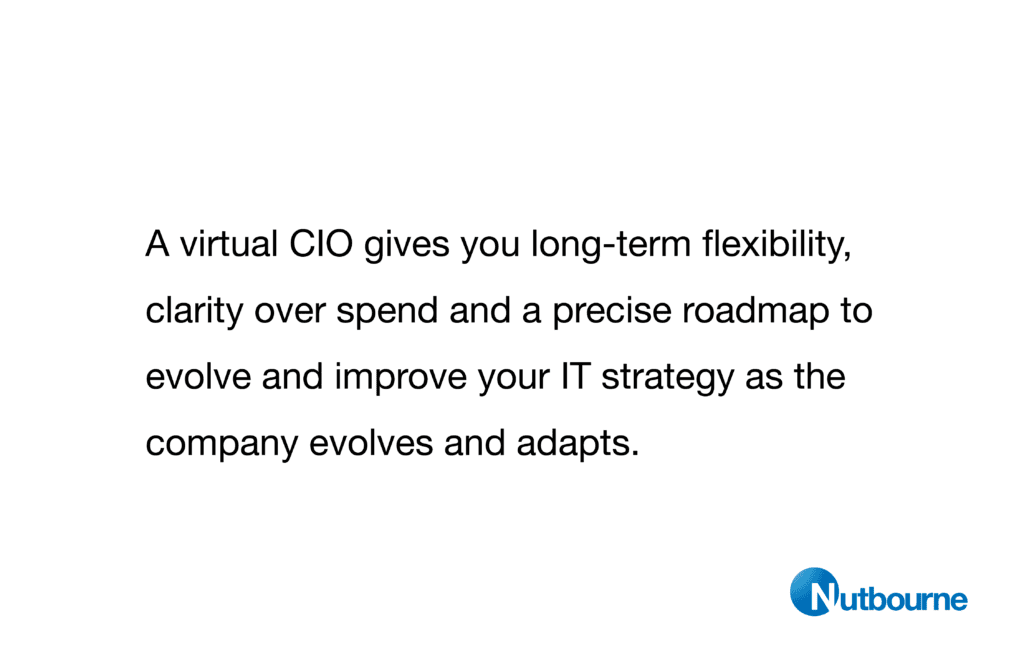The role of virtual CIO services are becoming increasingly important to modern organisations. In a world where data is king and information is high currency, they are not only stewards of a precious commodity, but architects of business strategy and growth.
Now more than ever, their role is evolving. They’re part IT guru, part strategist and part business leader. They’re at the forefront of modern companies. To find out how this unique blend of skills can help your organisation to move with the times, we spoke to Nutbourne’s Technical Director Patrick Burgess.
What Is A Virtual CIO? What Do They Do?
A virtual CIO stands for virtual Chief Information Officer. There are common variations – so you may see Chief Security Officer (CSO) Chief Information Security Officer (CISO) or Chief Technical Officer (CTO). These roles all perform slightly different functions in large companies. However, In a smaller company you often find many hats worn by a single person. Individually they are more prevalent in larger organisations because the scope and volume of their work is enough to justify a full-time employee (and a number of employees reporting into them). We understand that for small businesses it’s not the same.
Why Are They So Important?
CIOs are becoming increasingly relevant to organisations because of GDPR London and the rise in cyber crime. CIOs will define the approach a company takes toGDPR London, its business continuity policies (relating to IT) and data protection. CIOs have more of a focus on the information a company holds. They want to know how it is used, stored and handled. Focusing less on the systems that are doing it.
If, for example your company had a server stolen that contained sensitive information, or that gave access to the company’s systems, that’s a huge problem. The information could be trade-based or IP or it could be personal data (of clients or employees). That would be a serious breach of GDPR, which would come at an enormous financial cost to the business in the form of fines and lost revenue. Consequently, it would result in significant damage to its reputation.
In short, a CIO will define a company’s information strategy. Whilst routed in IT support, the scope of their role extends to information policy, practice development, planning, budgeting, resourcing and training.

I’m an SME. Do I need to bother with a CIO?
As we’ve established, you need to protect and organise your information. The big companies can afford to do this by employing a CIO to devise and implement a strategy. They’re aware of the risks of not doing so, and are prepared to invest to protect themselves.
Small and medium businesses can’t afford that. Some small and medium businesses can’t afford to do IT strategy in general. But that doesn’t preclude taking care of your information, or your obligation to do so under GDPR London. In fact, with cybercrime on the rise, it is negligent not to do so.
So yes, you do need someone to fulfil that role for you. But it doesn’t have to be costly, and you don’t need to employ a full-time CIO, and nor does it need to be a single huge expenditure. Little and often is what we recommend.
What does this look like in practice?
To do little and often, and to do it effectively, you need a roadmap and you need a plan. To put a roadmap and a plan in place, you need strategy, and to put strategy in place, you need somebody who knows and understands strategy. Now, most small and medium businesses can’t afford that person – and if they could, that person wouldn’t be full-time, because SMEs don’t require that level of input.
Putting a strategy and a roadmap together for small businesses takes no more than one week. To maintain, review and refine that strategy takes no more than a day a month, often less. This is where a Virtual CIO comes in. They’d be looking at your strategy and asking: How are you performing against it? What are the business needs? Have the business needs changed? Do you need to re-change your strategy and a roadmap to align what the business is trying to achieve? But that’s small work in the grand scheme of things.
At Nutbourne, we work closely with clients to benchmark their operations. This gives us a baseline from which to review clients. We can then establish how they’re performing across the board – because there are always multiple areas to focus on and to improve.

What Benefits Does This Have?
There are many benefits to the utilisation of virtual CIO services. They’re able to put your initial roadmap together, to spend a small amount of time with you each month and to review and refine your strategy. This gives you and your organisation a consistent and secure approach to Information over your next 12, 24 or 36 months.
It gives you long-term flexibility, clarity over spend and a precise roadmap to evolve and improve your IT strategy as the company evolves and adapts. The virtual CTO then works with you on a month-on-month basis to make sure that that roadmap is implemented and stays aligned to the business needs and the business strategy. That in turn makes yourIT support in Londoncost-effective and very affordable.
A virtual CTO or CIO can do the same for a small business in a couple of days a month that they may need a full-time job to do for a big business. It’s all about passing down the experience and the strategy. You want to make sure it’s approachable, affordable, and achievable for small business. For more information about our virtual CIO services, get in touch! To speak to one of our experts, call us on 0203 137 7273.
